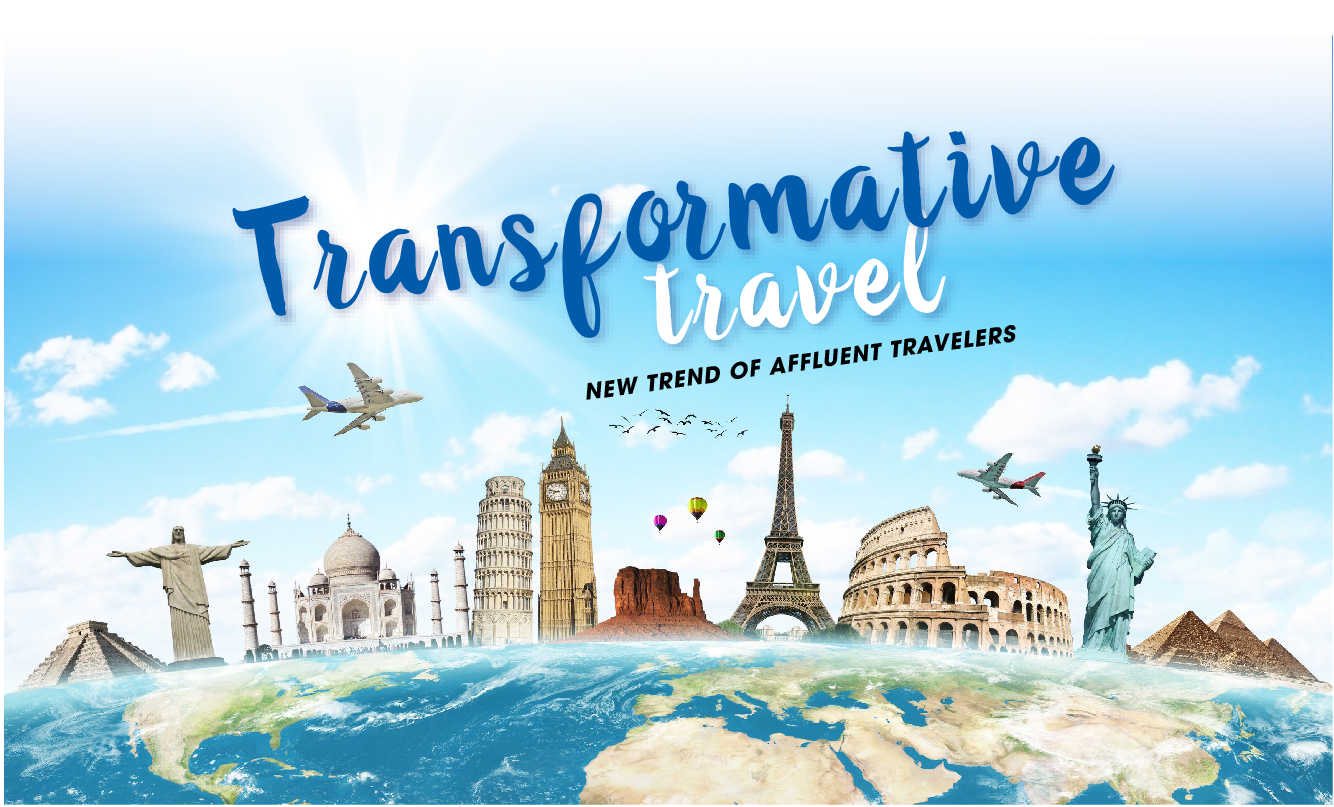advanced travelers who not only achieve financial success but also are highly knowledgeable about many fields ranging from culture, art to architecture and have delicate aesthetic tastes but become highly demanding in deciding the destination
definition of vacation or trip is usually associated with a common formula. It will definitely a 5-star destination with high-class concierge facilities and services from pickup limousines, private housekeepers to perfect menus
in prestigious Michelin restaurants – in the City of Fashion or on a picturesque beach to pamper yourself to get rid of hustle and bustle of urban life.

However, at the age of newly luxurious travel, a luxurious vacation by definition is not limited to that above-mentioned definition. Nowadays, according to Skift experts, what USD-million travelers desire to search for is original experience from world discovery travel that helps them to transform themselves in a more positive way. It creates a new entertainment in the affluent tourist community – Transformative Travel.

According to Maslow, in essence, human needs are divided into two major groups namely basic need and high-level needs. Basic needs are related to physiological needs for food, water and rest. High-level needs include several psychological factors such as equality, peace in mind, safety, happiness, social standing, respect, self-actualization or self-ego…

From marketing perspective, the global economy are transitioned from emphasis on respect, achieving others’ acceptance and agreement, into self-actualization, in which consumers adjust their purchase option of products or services that help them to demonstrate their ego and potentials.
The multiple growth in the luxurious living lifestyle market is creating overwhelming options and competiveness among consumers. Nowadays, USD-million travelers tend to consider travel as a way to self-actualize and transform themselves what they desire is not limited to visiting a new place, but they tend to search for experience and discover the world in a more profound and meaningful way until what they have acquired will help them transform their awareness and complete themselves.

According to the Personal Fulllment Is the New Ultimate Luxury report by Skift, nowadays, in the luxurious industry, although “exclusive” word has become not too attractive and new models inspired from sustainability have emerged, the most highly demanding consumers still want to experience the originality. Unforgettable and contingent experience still play important roles to these travelers, but self-transformation and completion acquired from travelling experience is the top priority.
According to Skift’s definition, transformative travel is any travel that enables people to make meaningful long-term changes regardless of significant or insignificant. This trend arises from high-risk travel and then permeated to the high-end segmentation. Skift defines transformative travel as any travelling experience that helps people transform in a more profound and meaningful way. This term becomes widespread by Transformational Travel Council, an organization founded by Jake Haupert and Michael Bennett in 2016 with view to helping others transform their lives with travel.
Transformational Travel Council aims to create a campaign focused on “HERO” definition – acronym of Heart, Engagement, Resolve và Open, that mean travelling with heart – Heart; seeking for engagement opportunity – Engagement; having resolution to overcome challenges – Resolve; willing to discover, experience, open up new things with heart, will and spirit – Open. This approach to travelling significantly increase probability to transform life.
According to Beth McGroarty – Research and Public Relation Director in Global Wellness Institute, experience gained from travelling will help people get rid of common beliefs and transform themselves considered as a way to “transform their brain and life”.

These transformations could take many different forms. It could be a mountain climbing trip to discover the spectacular nature, a homestay to learn about local culture, a meditation course to renew energy, a class with local handicraft artisans to appreciate traditional values or a volunteering campaign to support the community.

Luke Bailes – owner and CEO of Singita, which specializes in providing safari travelling services in Africa, states that connection, personalization and verification are three major factors of a transformative travel
Ideas about transformative travel are emerging in all market segmentation of the non-smoke industry and have drawn attention of travelers. A survey by Skift carried out in 2017 shows that this trend are becoming increasingly popular among travelers. Out of 1,350 travelers surveyed, 54% assess the importance of transformative travel at 7/10 scale or more while 52% show that they prioritize this travel.
A subsequent survey with 500 people carried out by in Skift in 2018 conveys a more profound view on travelers’ consideration for this travel, and thus it opens up an opportunity for brands and travel service providers. The survey shows that 32% of travelers admit that travelling experience has transformed them in a positive way while 24% of travelers who have never experienced emotional ups and downs desire to experience once ever.
There are some factors leading to transformation. Nearly 40% of those surveyed states that people they met during travel transform them while more than 30% states that improvisation, food, art, culture or entertainment are highly evaluated by the Millennials with nearly half the 18-34 year-old people stating that one of these factors is attributed to change their thinking.

Leigh Barnes – Northern American regional director of Intrepid Travel, states that there are more and more people want to visit Cuba and interact with the local to learn more about lives there or come to Nepal to climb the Mount Everest, travel to Rwanda or Uganda to see the gorillas, or come to visit Vietnam to discover the culinary world there.




